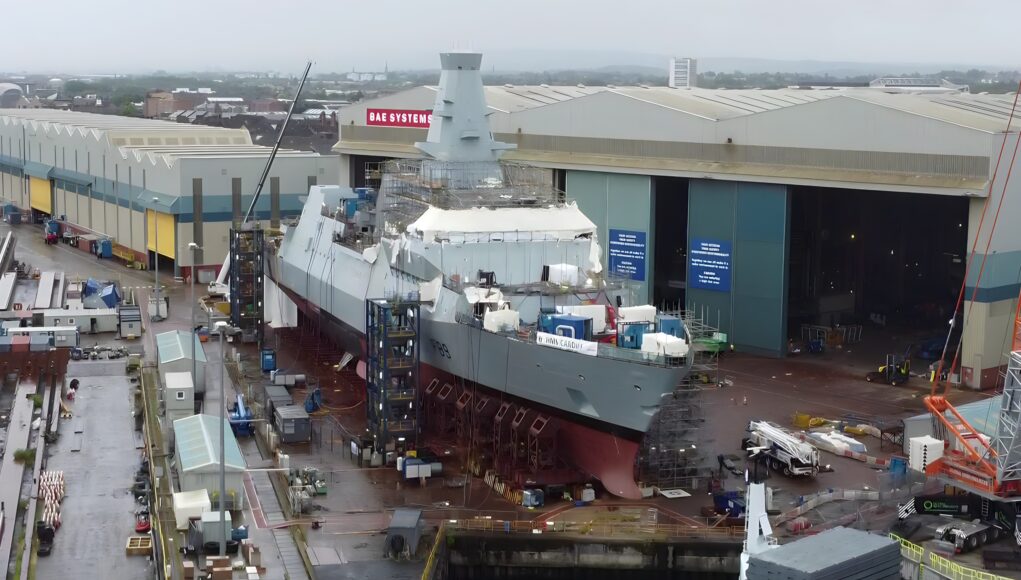The Scottish Parliament has debated the consequences of Norway’s decision to select the Glasgow-built Type 26 frigate as its next generation warship, with Labour MSP Paul Sweeney using the occasion to call for a dedicated shipbuilding strategy for Scotland.
The members’ business debate, led by Sweeney, followed confirmation of a reported £10 billion agreement for at least five Type 26 frigates to be built at BAE Systems’ Govan and Scotstoun yards. The motion noted that the order book now stands at 18 frigates, making it “the largest surface naval shipbuilding programme in Europe, rivalled only by those in the United States and China.”
Sweeney, a former BAE Systems employee, told the chamber: “The deal has brought with it a wave of optimism to the shipyards on the River Clyde, in stark contrast to when I worked there a decade ago. I think that I express the will of the whole Parliament in extending our gratitude and thanks to our Norwegian neighbours for their vote of confidence in our shipbuilders and the world’s best frigate design.”
He said the impact would be wide-reaching: “Not only will the deal with Norway directly sustain more than 2,000 jobs at the Govan and Scotstoun shipyards, providing a stable workload for the next 15 years; it will cascade work to 103 businesses across the shipbuilding supply chain in Scotland. Together, those businesses support more than 12,000 jobs in this country.”
Drawing on his own family’s experience of redundancies during the decline of the 1990s, Sweeney added: “This is not only about building ships; it is about building a future… That is the source of my motivation to play my own part in reviving Glasgow’s shipbuilding industry.”
The Glasgow MSP argued that the Scottish Government must now match the confidence shown by Norway. “We need a specific shipbuilding strategy for Scotland, and at the heart of that strategy must be a change to Scottish public procurement law to include a mandatory social value weighting in tenders for shipbuilding programmes,” he said.
He criticised the current approach as “outdated, laissez-faire public procurement policy… handing an unfair advantage to state-supported overseas competitors.” On the tendering of CalMac and lighthouse service vessels, he noted: “The Norwegian Government seems to have more confidence in Scotland’s shipbuilding capabilities than this Scottish National Party Government has—that is the reality.”
Sweeney pressed for the Scottish National Investment Bank to provide finance so local yards could compete with subsidised rivals in Spain, Turkey, Poland and China. He concluded: “This is personal, not political, for me. One of the main reasons why I am here in this Parliament is to help Scottish shipbuilding succeed.”
Other MSPs from across the political spectrum backed the deal as a landmark moment. SNP member Alasdair Allan said: “The latest order is the largest single defence capability investment in Norwegian history and certainly represents a vote of confidence in the company and in the wider Scottish economy.”
Conservative MSP Stephen Kerr highlighted Norway’s choice over rival designs: “Norway had other options. Designs from France, Germany and the United States were all under consideration, but it chose the British Type 26 because it is world class.” He also argued that the UK’s 2017 National Shipbuilding Strategy had been key in enabling exports.
Labour’s Davy Russell said the order “restores Glasgow’s shipyards to their place as the pride of the United Kingdom and Scotland” and pressed for “a comprehensive shipbuilding strategy and placing direct orders of any future ships and ferries.”
Alexander Stewart, a Conservative MSP, called the agreement “a landmark moment for the Scottish shipbuilding industry” and supported Sweeney’s point on the need for capital investment across commercial yards: “If we are to create that kind of environment, we must ensure that other yards can fulfil orders and provide capacity within the system.”
West Scotland Labour MSP Katy Clark highlighted Ferguson Marine’s uncertain position, warning: “Continued failure by the Scottish Government to deliver on the promised investment or to help the yard secure work is creating uncertainty about the yard’s future.”
Responding for the Scottish Government, Business Minister Richard Lochhead said: “The recent announcement from the Norwegian Government of a £10 billion investment in naval ships to be built on the Clyde has, of course, been welcomed by the First Minister and members across the chamber today… It is also… a vote of confidence in the workforce.”
Lochhead avoided attributing credit to one government but acknowledged: “It shows that our shipyards are competitive in what is a global industry.”














It’s mental how bad the SNP are and because of Reform they can look forward to another decade in power on 37% of the vote and keep claiming they have a mandate to break the country up.
Interesting that the £10Bn frigate order is in the top five bullet points by Starmer on Laura K this morning as to what he has achieved.
Starmer has achieved quite a bit more than just this order. Net investment into the UK of more than £250 billion already announced since Labour came into power. That’s more inward investment than all 14 years of Tory rule.
The UK needs to go further. We need to see more investment in the RN, additional type 26 frigates would be welcome news. I’d like to think at least 2, more could be squeezed out of the programme before the type 26 programme will have to switch to type 83 destroyers or the type 91+92 sloops.
The type 31 programme is also mature and ongoing. There is interest in this vessel from NZ as well as potentially some other nations. The RN needs to keep a steady drumbeat of construction going. Further type 31s makes a lot of sense, as does selecting the lengthened version as an armed littoral warfare platform able to deploy RM forces in reinforced company size with NGS, PODS platforms and enlarged flight deck for Chinook, UAVs etc. the enlarged type 31 could be a useful supplement within the MRSS programme.
ATM I’d be ecstatic if we just ordered five more slightly improved T31s.
If there was capacity the two or more T26’s would definitely be of great RN and industrial value.
The build costs will reduce even further as the build pace increases as a large chunk is yardstick overhead and deliberately slowed working pace.
The article fails to point out the value of the UK made parts incorporated in the AUS and CAN T26 variants.
Would you care to outline what Starmer has acheived Mr. B? I thought it had far more to do with U.K. companies succeeding in bringing in business.
I agree. The only way we can stand up to china is with a true military industrial strategy. The USA is loosing this battle and we are probably the only other country that can do anything about that.
I’m surprised the USN hasn’t been in touch. Our type 31 frigate programme should be of interest to them. Their Constitution class of FFGx is years delayed, massively over budget. The USN initially wanted a cheaper polyvalent unit for persistent presence and ASW. Instead it’s morphed into a mini Arleigh Burke class costing $2 billion each. Should have just stayed with the original FREMM design.
The UK could potentially construct 20+ type 31s for the USN within 15 years, just at a time when they need it.
It’s very strange the USN hasn’t reached out to help as their yard capacity is full. Their yards can’t commission anymore vessels quickly enough. Chinese shipbuilding capacity is x20 that of the USA’s currently.
The RN needs to get serious, build the warships now, whilst we still can, we won’t be able too if we enter a high intensity conflict Vs China, Russia and North Korea.
Norway’s intention was announced in April 2024 and August 2024 so where does Starmer come in?
As I’ve posted before this deal has clearly been cooking for years.
I suspect even before 2024.
I’d pretty much guarantee that most of the work was done before.
I’m slightly surprised that the work done by BAE on MRA4 integration with GCS systems hasn’t been thought about. As P8 leans on MRA4 integration and Norway have P8….they are designed to work as a pair.
If you have P8 you then have to start from scratch getting two primes to integrate them.
Good point on the T26. I didn’t know about the mra 4 integration but very valid I would have thought.
He closed the deal. It’s a political decision. Norway could have gone to France with their FREMM design or the Dutch-Germanic Damien offering based upon type 126 multirole warships (heavy destroyers) or the German Meko 360-400+ series designs.
Norway however looked across the North Sea, seen their reliable allies and partners building the world’s best ASW frigate and thought they want in on that programme.
It will come at a cost to the UK as hull number 3 HMS Birmingham is likely to be transferred across to Norway delaying the RNs fulfillment of the 8 ships being built. Then it will be one each thereafter. So our type 26 programme might not complete until well after 2035. I’d like to see the whole thing accelerated and an additional 2-3 more type 26s ordered for the RN.
Meanwhile Appledore yard should be commissioned to build all the type 91+92 sloops asap. They could churn out 2-3 sloops per year.
Just needs a bit of political will and I can see the UK becoming the ship building arsenal for NATO.
See my comment above re P8 T26 integration.
I was being very slow.
Obvs UK + AUS + CAN + Norway all have P8 so they are buying into an ecosystem.
I would argue that Bae close dthe deal. Starmer just happened to be in power but whatever? Agree with you on the number of hulls though. The time scale was bad before. Now it’s even worse. If we are going to do something about increasing the size of the fleet we should be looking to open up alternative yards.
There was three other contenders in the race in 2024 so what do you think was announced in Apr 2024? Starmer was PM in August 24.
Come on Jim. Norway had already set up the T26 as a front runner after three years of assessment. You reckon Starmer got it all done in six weeks? Please…
Let’s all play Fantasy Fleets !
Again and again and again and again.
It’s that or cry, to be fair!
How about if we just amalgamated the Royal Navy and the Royal Airforce into one lump, then we could have a fleet of Flying Boats ?
I bet they didn’t think of that !
Personal Question, do you fly ?
“I wish I could fly, right up to the sky but I can’t”
There are a few companies starting to build uncrewed flying boats, mostly in Japan where they retained manned ones. They aren’t really worth it in place of VTOL UAVs, though.
I do indeed fly, with the RAF cadets! I’ve been on powered AEF twice at RAF Benson and gliding at Syerston this summer.
Many years ago I looked at doing my PPL in America but a Woman turned up and my life as I knew it, ceased to be.
So why all of a sudden has the SNP become interested? It a UK national shipbuilding not Scotish.
The SNP is not interested, Sweeney is a labour MSP. If the Clyde yards closed tomorrow the SNP would be delighted as it just removes one more justification for leaving the UK.
My mistake, confused with Swinney.